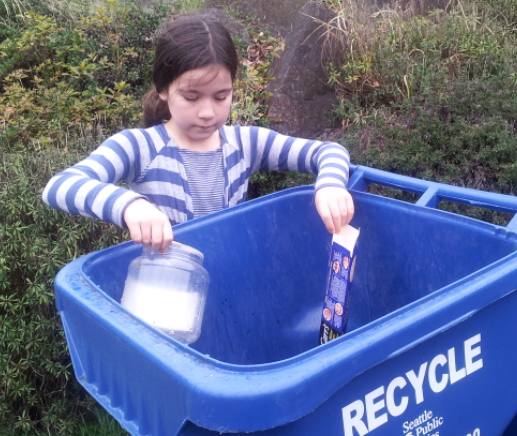
Image Source: Michelle Landwehr (permission granted)
Last week, someone posing as a Heartland Institute board member persuaded one of its staff members to send to a "new email" a board package, which he then released to environmental activist websites. The package contained descriptions of Heartland's intention to develop curriculum for K-12 children that would recast current teachings on global warming as a scientific controversy.
This change in basic science curriculum is surely as doomed to failure as the challenge to teaching evolution. Already, a group of climate scientists has urged Heartland to "recognize how its attacks on science and scientists have helped poison the debate over climate change policy." But it is interesting to consider what might happen if such a change were instituted. How vulnerable are children to misinformation about the environment? Do they even care?
It's a fair question. Children have never been more remote from nature. As a Children and Nature Networks paper summarizing 45 studies on the topic reported:
•In the early 2000s, 71 percent of mothers recalled playing outdoors every day as children, but only 26 percent of them said their kids play outdoors daily.
•In 2007, 42 percent of children ages 6 to 17 participated in outdoor activity less than 30 times a year.
•Between 1975 and 2005, walking and bicycling to school dropped nearly 25 percent.
•In 2005-2006, children between 8 and 18 spent an average of 6.5 hours a day with electronic media, though 1.75 of those hours are spent with music.
I first considered whether my daughter's generation would carry the environmental torch in 2005 when I heard talk given by Richard Louv at a Conservation International event. Louv, author of Last Child in the Woods and coiner of the term "nature deficit disorder," told us a story about when he took his children to a party at a park that sat above a river. His children bounded out of the car towards the water. The party's host shrieked in fear - they would be unsupervised! And exposed to God knows what! Louv used this story to illustrate that children are raised to see nature as something scary rather than as a source of wonder. Making his nature-deprived argument even more urgent, Louv asked, where will we find the people with the will to safeguard our National Parks and Forests? To run the EPA? Who in future generations will have the visceral love of nature that underscores its protection, even when that protection impedes growth?
Two things give me hope. First, the trend seems to be reversing. Though visits to US National Parks fell in recent decades, there are now signs of rebound, possibly due to the recession or greater public awareness about the benefits of nature for children. A 2005 study by the American Institutes for Research demonstrated that students in outdoor science programs improved their science testing scores by 27 percent. That same study found that participation in outdoor education was directly associated with improved conflict resolution skills and cooperation. Michele Obama's Let's Move campaign against obesity is focused on getting kids outdoors again. The National Wildlife Federation has a parallel effort called Be Out There, citing research that connects the lack of outdoor time to not only increased obesity, but also depression, stress, diabetes, ADD and poor performance in the classroom. PTAs are insisting recess be reinstated into the school day.
And I wonder if kids would even buy a teacher telling them that our behavior is not causing climate change. In her blog for CSRHub (my sponsor), Cynthia Figge posits that "(Those under 30) have an innate understanding of the ecological and social issues facing the planet. They do not debate whether these challenges exist or are an imperative for their generation."
Figge calls them "sustainability natives," arguing that just as citizens under 30 are digital natives for having grown up in an era where it is hardly an option not to be digital, so today's young people consider sustainability an immutable part of their culture.
At a very early age, society teaches children to act as-if they understand what their older siblings learn in school about climate change in simple acts like separating the recycling at home and outside too, at places like McDonald's and the movies.
So even if children are faced with a curriculum that demotes climate change to a scientific controversy, they will still act as-if because it's their native culture. It's built in to their screen time: the code for bad-guys is someone who smokes or doesn't recycle. WALL E was their first hero. They cheered in Avatar as much for the aliens as for the natural beauty that man was set to destroy. My bet is that Heartland will be hard-pressed to convince this generation otherwise.
